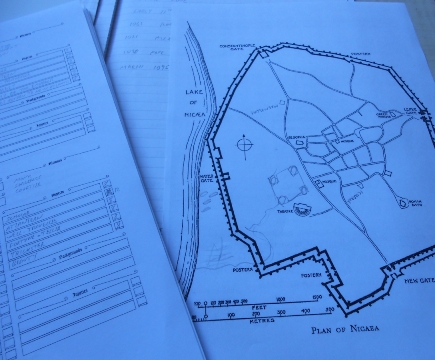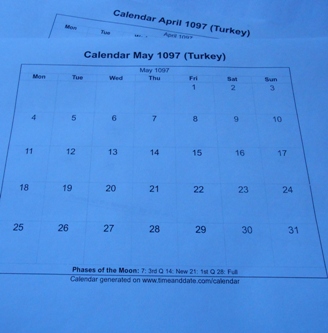[Originally posted 16 March 2017]
Some general insights into how my mind works when I plot a Game and when I turn that game into the purple prose of the Strikeforce story. You might want to read the first chapter of Strikeforce again, so you know what this is all talking about...
Time Is
The titles of the first three chapters are quotes from the story of Friar Bacon and the head of brass (an Elizabethan-era play by Robert Greene, though I'm pretty sure I must have read a modern retelling (possibly James Baldwin's, I'm not sure, it was a long time ago). The story itself pre-dates Greene's version. The head of brass says three things to Bacon's witless apprentice:
"Time is,"
"Time was,"
"Time is past"
The moral of the story is about not having the wit to see something before it's too late. I'm not saying the moral applies to Strikeforce, I just like the story and the quote, and it fitted these chapters.
Model GM-1
This name is a bit of conceit: GM, or "Games Master" is what I'm called when I run the Game. So the narrator here is me. In the Game, I play the Computer as a "non-player character". It gives me a useful in-game voice to answer player's questions.
The decision to make the Computer both a character and an omniscient narrator seemed like a good one when I started writing out the story, but became hard to sustain in the writing, so as times goes on the narrator tends to say less and less.
Characters
When I started the Game, I planned to run short "solo" adventures for each player individually, to get them used to their characters and the rules. Electron's was the only one I did in the end, and that one's reproduced here pretty much verbatim. The others are made up for the sake of the story, but I think are reasonably close to what we would have done.
The five players played Nightflyer, Scorpio, Avatar, Electron, and Black Swan. Everybody else in the story is "me".
Nightflyer
I have nothing to say about Nightflyer that isn't already shown in the story. He was the simplest character in terms of what he could do and also of knowing what he wanted to be right from the start. While I'm not supposed to have favourites, Nightflyer is the character I would have wanted to play if I was a player rather than the GM.
Scorpio
Probably the most problematic character. Scorpio's player decided almost from the start that he hadn't actually created the character he wanted to play, and almost immediately began changing it. He had a set of powers he very soon stopped using, and I have ignored some of these completely to make the story make more sense. He also started a deliberate change in the character's personality and motivations, which I have tried to reflect in the narrative.
Avatar
The idea that Avatar's spells were spoken in Atlantean was a much later addition to the character. Originally he just did "magic words". At the start, I hadn't fully worked out how and why magic worked in my universe, and I certainly had no thoughts about Atlantis and how it might be important. I'll get more into that as the story progresses, but I'm going to be assuming I had all these ideas right at the start in order to make the narrative more consistent. Also it makes it look more like I knew what I was doing.
Electron
Electron's player wanted the character to be light-hearted, always ready with a pun. The problem is, the player wasn't very good at on-the-spot puns! So that aspect of the character sort of vanished. I've tried to keep it in the story, but it isn't always easy.
Black Swan
I almost re-named this character to be just "Swan" for purposes of the narrative when somebody (years later) pointed out to me that it's a bit uncomfortable to have the team's sole black member have a name that includes the word "Black". But it's a comics tradition dating back at least to the 60s, when writers were a lot less politically correct: Black Panther, Black Racer, Black Goliath ... all I'll say is that Black Swan's player was following a comics tradition, and leave it at that.
Black Swan's player missed the first Game session, which is why the character is absent from the fight with the villains. This sometimes happens in a game. If you're lucky, you can work the plot around the missing character (as here: because we were just staring out it was easy to just exclude her). If we stopped the last session at a point where the character has to be present, I can play the character, keeping it in the background as much as possible and hopefully being true to what the player would have wanted to do, but I really don't like doing that. Worst case scenario, we abandoned that week's Game and played Star Fleet Battles (or something) instead.
Villains
The four villains weren't particularly well fleshed out, as they were really only there to introduce the players to the combat rules and I never expected to use them again (as I knew I would move the action to the 20th century). The most notable thing about them was the name "Killervolt", which I really liked. I have a thing about names that are puns.
Chief Kadnez
This is a deliberate homage to Chief Zendak, the head of the Science Police in the Legion of Super-Heroes (DC Comics).
Carl Zod
Confession time: Zod, probably the most hated name in the whole Game, was a slip of the tongue. I wanted to call him "Professor Z" as a joke version of the X-men's "Professor X". But on the day of the Game, when I introduced him, for some unfathomable reason I said "Zod" instead of "Zed". I let it stick, and the rest is history. It had nothing to so with Superman's Zod, as some people have assumed.
1987
If you think about it, the whole plot of vanishing time is ridiculous. Going back in time to stop ... something nebulous that's erasing the timeline. I actually had a whole physics of time travel worked out, explaining how alternate and vanishing timelines worked, and why you have a week of "your time" before you need to go back 400 years to stop it. But even so, I still can't understand why nobody (no player) ever asked "What if it's our intervention which causes it?" Luckily, suspension of disbelief won, otherwise there may never have been a Game.





